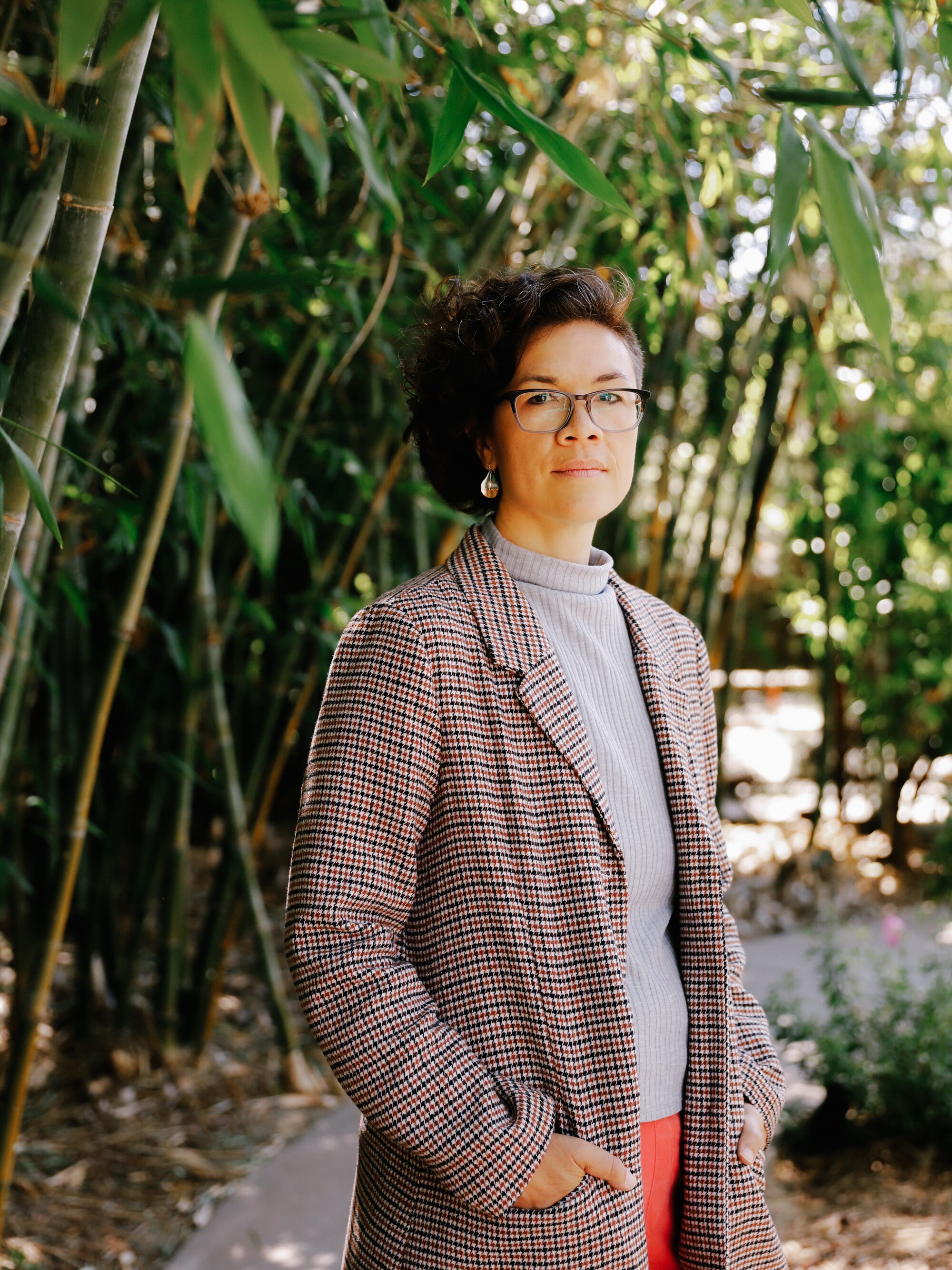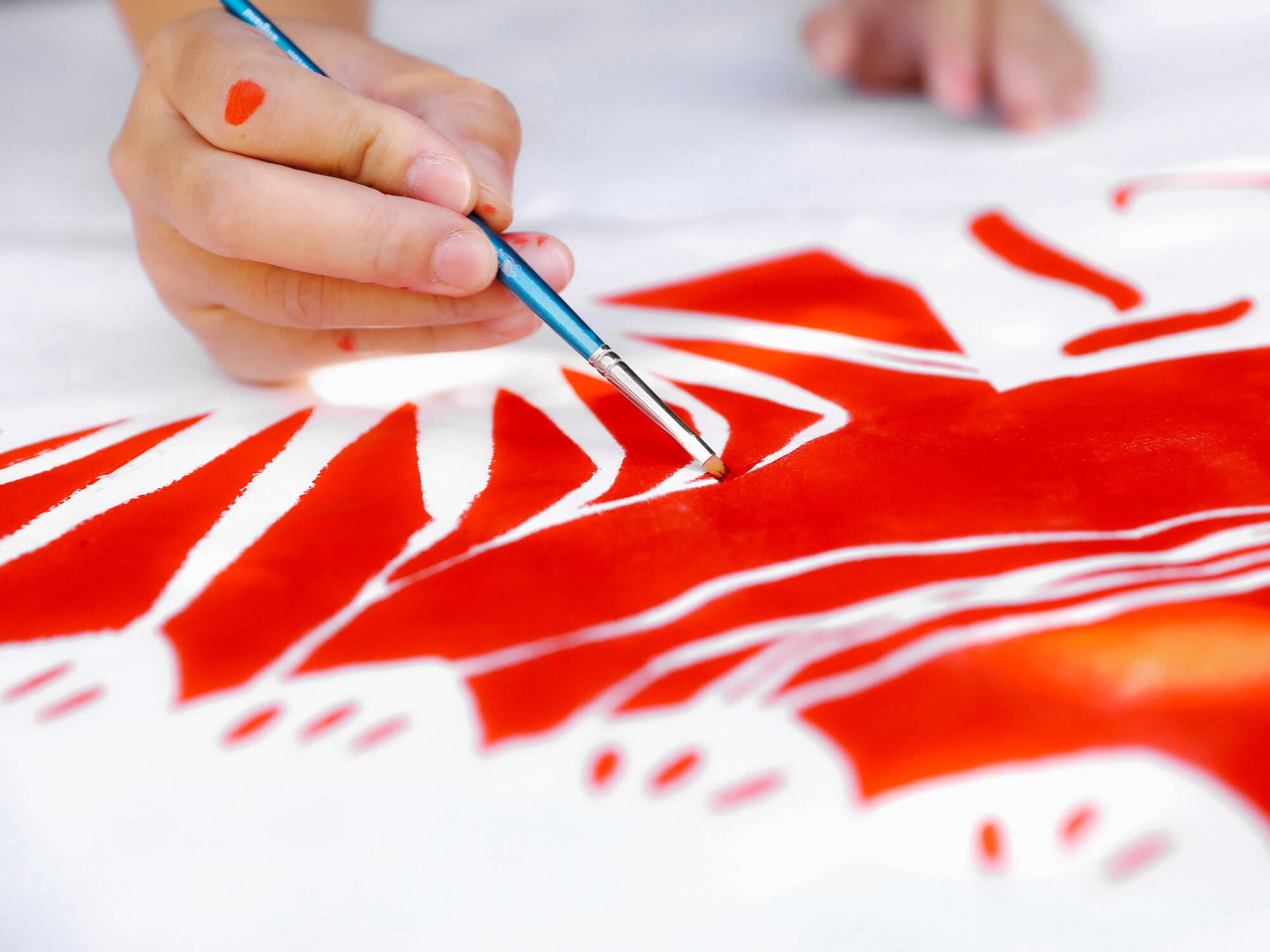A single kite cuts across the sky above Los Angeles State Historic Park, its hexagonal body flipping in the wind.
The park sits on the edge of Chinatown, just northeast of downtown L.A. The city pulses around it — the Gold Line tracks flank one side, industrial warehouses the other. But this stretch of land is still and calming, all unobstructed blue sky and vast green lawn cut only by a flittering white kite line — an Ellsworth Kelly-like urban oasis.
The kite dances in the air, the embodiment of levity. But it bears a powerful message: “Protect Public Lands.”
The arts organization Clockshop is test flying this kite — a handmade work by artist Audrey Chan with a bamboo backing by artist-kitemaker Stevie Choi — in advance of its second kite festival on Saturday. The event, Community and Unity People’s Kite Festival, will launch a veritable art gallery in the sky with kites of all varieties — enormous diving dragons, swooshing centipedes and tiny diamonds in an explosion of color. But the festive-looking scene, which the public is invited to participate in for free, is also a powerful statement meant to celebrate equitable access to public land in L.A. and advocate for its preservation.
“We need to continue to protect parks over time,” says Sue Bell Yank, Clockshop’s executive director. “Once it’s built, it’s a wonderful victory. But we have to then continue to steward the land.”
Commercial development, however, is an ever-present threat to L.A.’s existing green space, Yank says, noting what she feels to be the most imminent danger: a proposed gondola system, Los Angeles Aerial Rapid Transit (LA ART). Aiming to open before the Olympics in 2028, it would transport passengers between Union Station and Dodger Stadium, with gondola cabins sailing through the air as a way to mitigate traffic jams on baseball game days. It would also include a stop in Chinatown, with the gondolas crossing the airspace over the edge of the park.
“There’s a history of encroachment in historic Chinatown,” Chan says. “The 110 Freeway was built and cut right through the neighborhood. The gondola proposal would be history repeating itself.”

During the pandemic, artist Audrey Chan took up flying and making kites. Now, she is designing five kites for the “Community and Unity People’s Kite Festival” in L.A.
(Christina House / Los Angeles Times)

“We need to continue to protect parks over time,” says Sue Bell Yank, Clockshop’s executive director.
(Christina House / Los Angeles Times)
A spokesperson from LA ART, Jennifer Rivera, says the gondola system would only pass over the southeastern edge of the park, and the project’s Chinatown transit stop would increase public access to the area, which is a goal of the project.
“This zero-emission aerial rapid transit connection will increase access to a world-class park for families without the need to drive in a car,” Rivera said in an email statement.
Yank says the kite festival is not meant to be an outright “protest event,” but rather a celebration of the unobstructed open space that does already exist there and a way to draw attention to the issue through the lens of joy.
The festival also honors the diverse communities situated around the 32-acre park, immigrant enclaves in Chinatown, Solano Canyon and Lincoln Heights, which fought to turn the parkland — a former rail yard turned “brown field” that sat vacant for more than two decades — into state-owned green space for public use instead of being developed as an industrial center. The park area is also a historic focal point of early Los Angeles’ development. A remnant of the historic Zanja Madre, which carried water from the L.A. River into El Pueblo de Los Angeles, is still visible there.
The park opened to the public in 2017. During COVID-19 lockdowns, it served as a much-needed outdoor escape for local residents to gather — with the open sky providing an integral component of that peaceful respite.
“People think the ground beneath them is the land,” kitemaker Choi says, “but the sky is also public land.”
Kites — the implicit freedom and openness — are the perfect vehicle to express that idea.
“There’s a deep richness in the history of kitemaking across many cultures,” Yank adds. “And it’s a very accessible activity that people of all ages and backgrounds can participate in.”
Chan is making five, large-scale Rokkaku-style kites — traditional six-sided Japanese kites — crafted from Japanese mulberry paper, which is especially light but also sturdy. She stenciled on the design, slathering on bright red or white block printing ink with a roller. She then fine-tuned the imagery with a small, hand-held brush.
The design, the same for all five kites, is inspired by both Chinese paper-cut and Mexican Papel Picado traditional styles. The stenciled images are drawn from the neighborhoods’ rich cultural histories. They include an abstracted take on a Tongva reed dwelling, plants native to the L.A. River and a water wheel connected to Zanja Madre, among other things.
“I’m really interested in hyper-specific, allegorical imagery,” Chan says, “especially symbols and images drawn from communities that can be activated and put in conversation with one another.”

(Christina House / Los Angeles Times)

Chan paints a kite at Clockshop in Los Angeles.
(Christina House / Los Angeles Times)
Chan also crafted 100 small white diamond kites. Each bears one of nine messages, such as “Protect Our Neighborhoods,” in either English, Spanish or traditional Chinese characters. They’ll be free to visitors to fly themselves.
Yank says Chan was the ideal artist to design the kites, given her work at the intersection of public art and advocacy. Chan’s three-story-tall mural, across the façade of the American Civil Liberties Union building in the Westlake area, was unveiled in early 2021. Her installation of porcelain enamel steel panels, which debuts at L.A. Metro’s Little Tokyo/Arts District Station when it opens later this year, speaks to the layered history of the neighborhood.
Choi — who recently co-led a kitemaking workshop at the Los Angeles County Museum of Art — mounted Chan’s paper designs onto handmade bamboo structures with string and glue, so they could take flight.
The festival also hopes to shine a light on L.A.’s housing crisis, as well as the role of parks in climate resiliency and social cohesion. There’s a need for more affordable housing in L.A., Yank says, even in already dense urban areas. But that must be “planned carefully.”
“It’s not just about open green space for the sake of it,” she says, “but really thinking about how do communities stay in place, not get displaced, have good affordable housing options and also access to open green space and public resources. And having green space helps mitigate that concrete heat sink effect so people can gather.”
Which isn’t to say the event won’t also be pure fun. Kites bring out playfulness, Chan says. During the pandemic, her family took up flying kites on the beach.
“I never successfully flew kites before and neither had my husband,” she says. “But it became a new hobby. We felt like kids again.”
Clockshop says the American Kitefliers Assn. recommended the Los Angeles State Historic Park location, which frequently morphs into a veritable wind tunnel in the afternoon — making it an ideal kite-flying spot.
At Saturday’s event, kite masters Scott Skinner and Joe Hadzicki will be on hand to demonstrate techniques and offer tips. Should wind conditions permit, Kim Wong, daughter of the late famed Disney animator and prolific kitemaker Tyrus Wong, will fly her late father’s large-scale animal creations, including a 96-foot-long, multisegmented centipede.
There will also be fabric dyeing workshops, printmaking workshops and paper crafts, as well as live musical performances.
“It’s about celebrating the beautiful diversity that is L.A.,” Yank says. “About coming together in this space that we fought for.”
‘Community and Unity People’s Kite Festival’
Where: Los Angeles State Historic Park, 1245 N Spring St., Los Angeles
When: Saturday May 21, 2-6 p.m.
Cost: Free
Info: clockshop.org
Stay connected with us on social media platform for instant update click here to join our Twitter, & Facebook
We are now on Telegram. Click here to join our channel (@TechiUpdate) and stay updated with the latest Technology headlines.
For all the latest Art-Culture News Click Here
